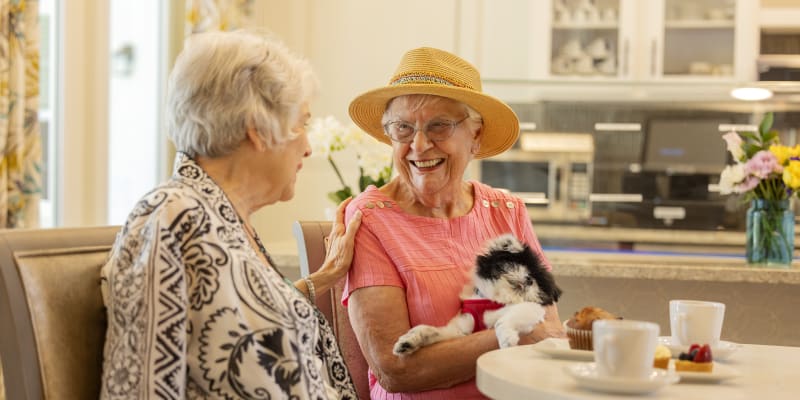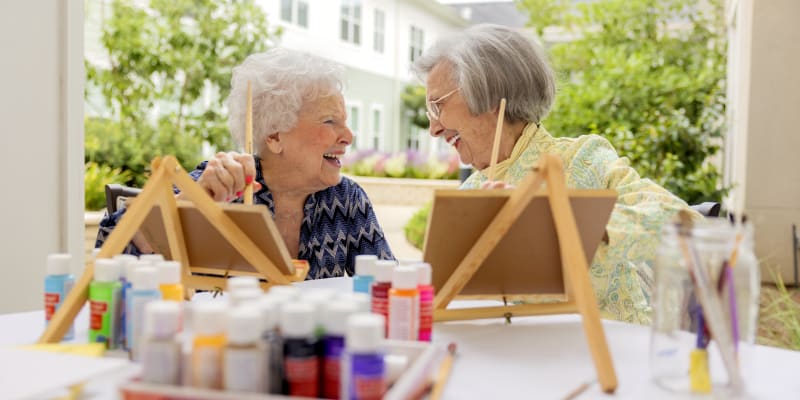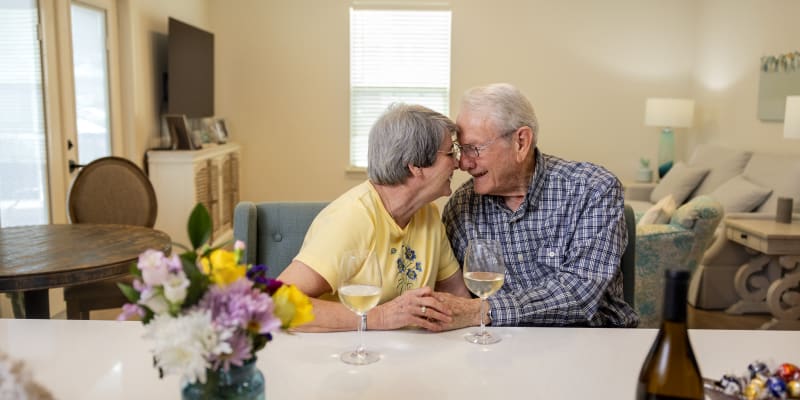As our loved ones age, it’s natural for them to require additional care and support. While some seniors are able to continue living independently, others may need assistance with daily activities, medical care, or simply the comfort of having someone nearby. If you’re an adult child of an aging senior, it’s common to worry about their well-being and whether they feel comfortable and happy in their living situation. In this post, we’ll explore some tips for helping seniors adjust to senior living and create a sense of home.
Personalize the space
Moving into a new living space can be challenging, especially if it feels unfamiliar and sterile. Personalizing a senior's living space is a great way to create a sense of familiarity and comfort. Moving to a new living space can be challenging, and it's important to make the transition as smooth as possible. According to a study by the National Institute of Health (NIH), personalization of the living space can lead to increased comfort and a sense of control among seniors residing in senior living communities.
Bringing in items that are familiar to the senior, such as family photos, can also promote social connections and well-being. A study by the American Psychological Association (APA) found that reminiscing about personal experiences and memories can improve mood and reduce feelings of loneliness in seniors. By displaying family photos, seniors can maintain a connection with loved ones and feel a sense of belonging.
Encouraging seniors to decorate their space in a way that reflects their personality and interests can also promote self-expression and autonomy. A study published in the Journal of Housing for the Elderly found that incorporating resident preferences into the design of senior living communities can lead to greater resident satisfaction and a sense of home. By allowing seniors to personalize their living space, they can feel a greater sense of control over their environment and enhance their overall well-being.
It's important to note that personalizing a senior's living space does not need to be expensive or elaborate. Simple touches, such as bringing in a favorite blanket or hanging a cherished piece of artwork, can make a big difference in promoting comfort and familiarity.
Stay connected
As we age, social connections become increasingly important for maintaining mental and physical well-being. For seniors who are adjusting to a new living environment, feeling connected to family and friends can be especially important in combating feelings of isolation and loneliness. Social isolation and loneliness can lead to increased risk for depression and cognitive decline.
One way to stay connected with seniors in a new living environment is to make a point to visit often and involve them in family activities when possible. This can help them feel included and valued and provide a sense of belonging. In addition, regular phone or video calls can help maintain connections even when distance makes in-person visits difficult.
Another option to consider is enlisting the help of a local volunteer or companion service to provide additional social support. Many senior living communities offer social programs and events designed to bring residents together and foster a sense of community. In addition, there are numerous organizations and services that provide companionship and social support for seniors, such as local senior centers, Meals on Wheels, and volunteer visiting programs.
Volunteer programs, in particular, can provide valuable social connections for seniors. A study by the National Council on Aging (NCOA) found that volunteering can lead to improved mental and physical health outcomes for seniors, including decreased risk of depression and improved cognitive function. By volunteering in their community, seniors can not only stay socially engaged but also maintain a sense of purpose and accomplishment.
In addition to staying connected with family and friends, it's important to recognize and address any underlying mental health concerns that may be affecting a senior's social connections. Depression and anxiety are common among seniors, and can be exacerbated by feelings of isolation and loneliness. Encouraging seniors to seek professional help when needed, such as from a therapist or counselor, can help address these issues and improve overall well-being.
Encourage participation in activities
Encouraging seniors to participate in activities can be a great way to promote social connections and reduce feelings of loneliness. Many senior living communities offer a variety of activities and events for residents to participate in, such as fitness classes, game nights, art classes, and social events.
Participating in activities can provide a sense of purpose and enjoyment, and it can also help seniors maintain physical and mental health. Additionally, regular physical activity can improve mobility, balance, and overall health.
When encouraging your senior loved one to participate in activities, it's important to consider their interests and abilities. Finding activities that they enjoy and feel comfortable with can help increase their engagement and sense of fulfillment. Some seniors may prefer more low-key activities, such as reading or crafts, while others may enjoy more physically demanding activities, such as swimming or dancing.
Encouraging seniors to try new activities can also be beneficial. Trying new things can help seniors maintain cognitive function and may lead to new hobbies or interests. Additionally, it can help seniors feel more connected to their community and meet new people.
In addition to activities offered by senior living communities, there may be other community organizations or volunteer opportunities that seniors can participate in. This can be a great way to get involved in the community and meet people outside of the senior living community.
It's important to note that participation in activities should be voluntary and not forced. While it's important to encourage seniors to participate, it's equally important to respect their preferences and choices. Some seniors may prefer to spend time alone or engage in quieter activities, and that's okay too.
Maintain routines and rituals
Encouraging seniors to maintain their daily routines, such as reading the newspaper over breakfast or taking an afternoon walk, can help them feel a sense of familiarity and control in their new living environment. According to one study, maintaining daily routines can lead to increased feelings of well-being and reduce stress in seniors.
Preserving family traditions, such as holiday celebrations or special events, can also provide a sense of continuity and connection to loved ones. While it may not be possible to continue these traditions in the same way as before, modifying them to fit the new living situation can help maintain their importance and significance. For example, if your family has always celebrated Thanksgiving dinner together, but your senior loved one now lives in a senior living community, consider bringing a traditional Thanksgiving meal to share with them and other residents.
In addition to daily routines and family traditions, it's also important to maintain medical and self-care routines. This can include maintaining a regular sleep schedule, taking medications as prescribed, and keeping up with appointments and check-ups. Encouraging seniors to stay active and engage in activities that they enjoy can also help maintain a sense of routine and purpose.
When helping seniors maintain routines and traditions, it's important to be flexible and adaptable. While routines can provide a sense of stability, it's also important to be open to change and modification as needed. Some routines may need to be adjusted to fit the new living situation, and that's okay. By working with your senior loved one to identify what routines and traditions are important to them, you can help create a sense of continuity and familiarity in their new living environment.
Help them stay organized
Managing medications, appointments, and household tasks can become more challenging as we age. One way to help seniors stay organized is by creating a schedule or checklist to help them keep track. This can help ensure that they are taking the right medications at the right time and that they don't miss important medical appointments. There are many tools available to help with medication management, including pill organizers and medication reminder apps. These tools can be especially helpful for seniors who are managing multiple medications.
In addition to medication management, helping seniors stay organized with household tasks can also be beneficial. This can include offering to help with grocery shopping or bill paying or assisting with tasks such as laundry or cleaning. By helping seniors stay on top of these tasks, you can reduce their stress and help them feel more in control of their daily lives.
Another way to help seniors stay organized is by simplifying their living environment. This can include decluttering their living space and organizing their possessions in a way that is easy to navigate. Simplifying their living space can make it easier for seniors to find what they need and reduce feelings of overwhelm or confusion.
When helping seniors stay organized, it's important to respect their autonomy and preferences. Some seniors may be resistant to outside help, while others may welcome it. By working together to identify what tasks are most challenging for your senior loved one, you can find ways to support them in a way that feels comfortable and empowering.
Keep them active and engaged
As we age, physical activity becomes increasingly important for maintaining overall health and well-being. However, physical activity can be challenging for seniors who may have mobility issues or other health concerns. Encouraging seniors to stay active and engaged can have numerous physical and mental health benefits.
Regular physical activity can help seniors maintain muscle strength, flexibility, and balance. This can reduce the risk of falls and improve overall mobility. According to a study by the World Health Organization (WHO), physical activity can also reduce the risk of chronic diseases such as heart disease, stroke, and diabetes in older adults.
Encouraging seniors to stay active can also have mental health benefits. Regular physical activity has been shown to improve mood, reduce stress and anxiety, and improve cognitive function. It can even reduce the risk of cognitive decline and dementia in older adults.
When encouraging seniors to stay active, it's important to consider their abilities and limitations. Modifying activities to fit their abilities can help them stay active and engaged without risking injury or discomfort. This could include taking short walks, doing chair exercises, or participating in seated yoga or tai chi classes.
Senior living communities offer a variety of fitness classes and activities that are tailored to the needs of older adults. Encouraging seniors to participate in these activities can provide a sense of community and social connection, as well as physical and mental health benefits.
It's important to note that seniors may need extra support and encouragement to stay active, especially if they are dealing with health issues or chronic pain. Encouraging seniors to set realistic goals and celebrating their progress can help them stay motivated and engaged.
Focus on the positives
Adjusting to a new living situation can be challenging for seniors, especially if it means leaving behind their familiar home and community. It's important to acknowledge and validate their feelings of loss and change while also helping them focus on the positives of their new living situation.
Encouraging seniors to find things they enjoy about their new environment can help shift their perspective and promote a more positive outlook. This could include the friendly staff, beautiful landscaping, or access to amenities like a pool or library. Focusing on these positives can help seniors feel more comfortable and engaged in their new living environment.
Additionally, it's important to remind seniors that adjusting to change takes time and that it's okay to take things at their own pace. Moving to a new living situation can be overwhelming, and it's important to allow seniors the time and space they need to adjust. Encouraging them to take small steps, such as participating in an activity or meeting new people, can help them gradually acclimate to their new environment.
It's also important to involve seniors in decision-making and give them a sense of control over their living situation. This could include allowing them to choose their own decor or furniture or giving them input on which activities they would like to participate in. By involving seniors in decision-making, we can help them feel more invested in their new living situation and reduce feelings of powerlessness.
Finally, it's important to maintain open and honest communication with seniors about their feelings and experiences. Encouraging them to share their concerns and preferences can help build trust and foster a sense of connection. Listening to their feedback and addressing their concerns can also help promote a more positive experience in their new living environment.
Final Thoughts
Helping seniors adjust to senior living is important for their well-being and happiness. Personalizing their living space with familiar items, staying connected with family and friends, encouraging participation in activities, maintaining routines and rituals, helping them stay organized, keeping them active and engaged, and focusing on the positives are all essential ways to make the transition to senior living easier. By taking these steps, we can ensure that our senior loved ones feel comfortable, happy, and engaged in their new living situation. While it may take time to adjust, with patience, support, and communication, seniors can thrive in their new environment and continue to lead fulfilling and meaningful lives.









